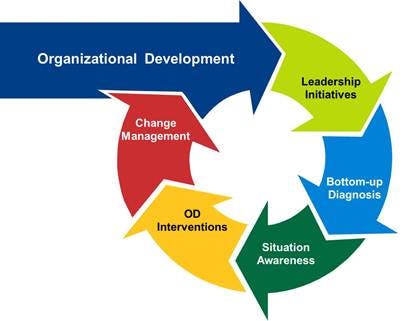Organisational Development (OD) is a new trend that enhances the role of HR to become a true strategic partner in business. It is defined as a planned effort for a workgroup or organisation, managed by leadership and supported by employees to increase organization effectiveness through planned change in processes and systems. Organisational development is a collection of change method that aims to improve organisational effectiveness and employee well–being. The term organizational development was coined by Richard Beckhard in the mid-1950s. It is basically a framework for change, which is known as both a field of applied behavioral science focused on understanding and managing organizational change and as a field of scientific study and inquiry. OD is a systemic learning and development strategy intended to change the basics of beliefs, attitudes, and relevance of values and structure of the current organization to better absorb disruptive technologies, market opportunities, and ensuing challenges and chaos.
The main objectives of OD are:
- To increase the level of inter-personal trust among employees.
- To increase the employee's level of satisfaction and commitment.
- To confront problems instead of neglecting them.
- To effectively manage conflict.
- To increase cooperation among the employees.
- To increase the organization problem-solving.
- To put in place a process that will help improve the ongoing operation of the organization on a continuous basis.
A normal OD process can be phased as follows:
- Problem Identification;
- Data Collection;
- Diagnosis Planning and;
- Implementation Evaluation and Feedback.
Problem identification
This involves understanding and identification of the existing and potential problems in the organization. The awareness of the problem includes knowledge of the possible organizational problems of growth, human satisfaction, the usage of human resource and organizational effectiveness.
Data Collection
To understand the exact problem, the relevant data is collected through personal interviews, observations, and questionnaires.
Diagnosis
OD efforts begin with a diagnosis of the current situation. Usually, it is not limited to a single problem. Rather a number of factors like attitudes, assumptions, available resources and management practices are taken into account in this phase. There are four steps in organizational diagnosis:
- Structural analysis: Determines how the different parts of the organization are functioning in terms of laid down goals.
- Process analysis: Process implies the manner in which events take place in a sequence. It refers to the pattern of decision making, communication, group dynamics and conflict management patterns within an organization to help in the process of attainment of organizational goals.
- Function analysis: This includes strategic variables, performance variables, results, achievements, and final outcomes.
- Domain analysis: Domain refers to the area of the organization for organizational diagnosis.
Planning and implementation
After diagnosing the problem, the next phase of OD, with the OD interventions, involves the planning and implementation part of the change process.
Evaluation and feedback
Any OD activity is incomplete without proper feedback. Feedback is a process of relaying evaluations to the client group by means of specific reports or interactions.
Organisational development provides opportunities for people to function as human beings rather than as resources, it provides opportunities for each organization member, as well as for the organization itself, to develop to their full potential. It increases the effectiveness of the organization in terms of all of its goals. OD provides opportunities for people in organizations to influence the way in which they relate to work, the organization, and the environment. This is why OD has become a trending issue in HR as it has become an integral part of ensuring the success of a business. It bridges the gap between the employee and the business ensuring mutual success.
Fadzai Danha is a Consultant at Industrial Psychology Consultants (Pvt) Ltd, a management and human resources consulting firm. Phone +263 (242) 481946-48/481950 or email: fadzai@ipcconsultants.com or visit our website at www.ipcconsultants.com
